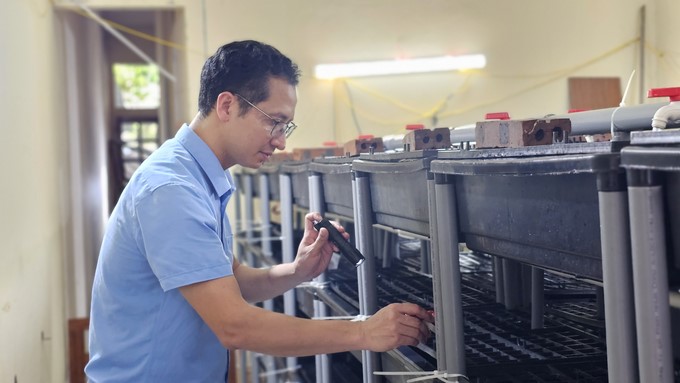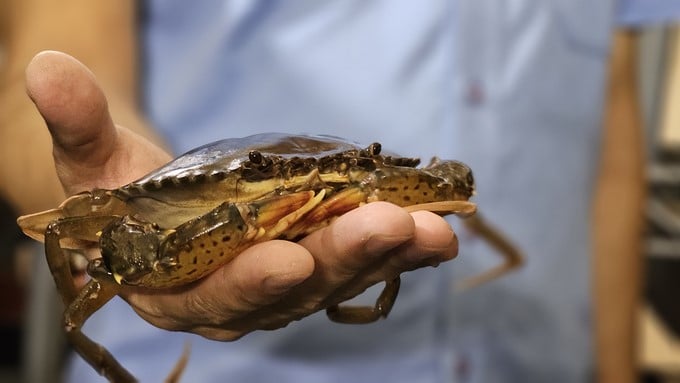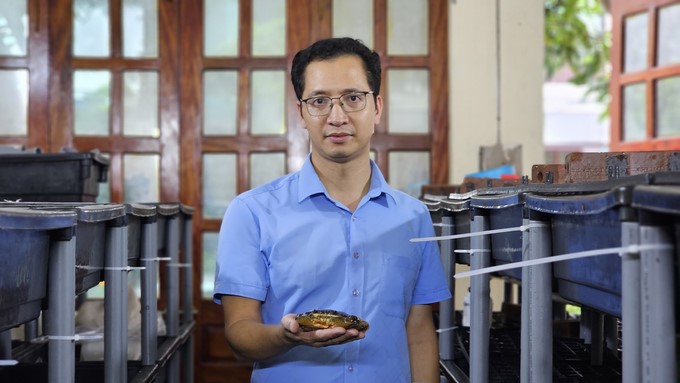November 22, 2025 | 12:20 GMT +7
November 22, 2025 | 12:20 GMT +7
Hotline: 0913.378.918
November 22, 2025 | 12:20 GMT +7
Hotline: 0913.378.918

Mr. Nguyen Ba Canh, the first person to successfully raise sea crabs in the box in Lao Cai. Photo: Hai Dang.
Mr. Nguyen Ba Canh in Bac Cuong ward (Lao Cai city) is the first person to successfully raise sea crabs on a farming trestle in the Lao Cai mountainous region, up to 500km from the sea.
After a period of research, Mr. Canh self-invested in an indoor sea crab farming trestle of about 100 m2. Different from the model of sea crab farming in some places where each crab is raised in a small box, in Mr. Canh's model, sea crabs are raised at the same time with 8–9 heads in a tray.
The trays are stacked with multiple layers, so they do not take up space and are easy to disassemble and move, making them convenient for the stage of daily crab care and feeding. Indoor sea crab farming saves investment costs, has an airy space, and can control the environment and temperature.
"Each indoor farming trestle does not require a lot of investment, less than VND 80 million, and can raise 100–200 heads. With big crabs, it is possible to tie the claws to avoid the crabs fighting each other and breaking the claws, thereby getting a first-class product," shared Mr. Canh.
According to Mr. Canh, the traditional model of raising sea crabs in ponds and the form of farming in boxes in recent times have existed in many places, but for raising sea crabs in the mountainous region of Lao Cai, he is the first person to successfully implement this farming model. On the other hand, this model of sea crab farming uses self-prepared seawater, which costs only a few hundred thousand dongs per m3, while imported seawater costs VND 1.2–1.5 million/m3. Because Lao Cai is quite far from the sea and time-consuming to travel, Mr. Canh's sea crab farming system has overcome many disadvantages. This is a complete model with a methodical farming process.

Soft-shell crabs are raised at Mr. Canh’s facility before the time of preparation for sale. Photo: Hai Dang.
The whole system and farming trestle are optimized and improved to easily care for and clean, reduce space, and still raise a large number. In particular, the stage of water treatment is extremely important for sea crab farming. Accordingly, the water treatment system is designed according to the principle of circulation, removing impurities and adding necessary minerals.
When water is put into the crab farming trays, the leftovers and sediments go through the pre-filtration system, then to the microbiological tank and disinfection system. After that, the water is reused, helping to save costs and not pollute the environment.
Water quality as well as parameters of temperature, salinity, minerals, and other components are automatically adjusted to ensure the best environment for crabs to grow and develop.
Sea crabs raised in Lao Cai are soft-shell crabs, also known as double-skin crabs. The process of shelling takes place within 1–2 days. This crab type is rare in the wild because it is the most delicious crab type and is favored by consumers.
According to Mr. Canh, the most difficult problem is the transportation of crab seed because transporting crab seed and feed from the sea to Lao Cai takes 8–9 hours, so crabs need a lot of time to recover and face the risk of dying in the transportation process. Crab seeds put into farming must be carefully selected and have firm meat to grow into soft-shell crabs with the formation of double skins. The crab at this time will be used up without leaving the shell because the crab is very soft.

Indoor crab farming initially shows efficiency and low initial investment costs. Photo: Hai Dang.
"In order to successfully raise this type of soft-shell crab, it always requires a clear understanding and stable water quality so that the crabs can shed their shells. Each litter of farmed crabs takes about 25–30 days to be sold, with an average yield of 3-5 heads/kg," said Mr. Canh.
In the Lao Cai market, soft-shell crabs are currently sold for about VND 700,000–800,000/kg. This commodity is also quite favored by Chinese tourists, especially tourists from Ha Khau (China), who can walk through Lao Cai International Border Gate to Lao Cai to enjoy seafood dishes.
Translated by Huyen Vu Thu

(VAN) The information was shared at the seminar 'Urban Agriculture - Solutions for Developing Green Spaces,' organized by the Kinh te & Do thi Newspaper and the Biotechnology Center of Ho Chi Minh City.
/2025/11/19/4141-2-132831_216.jpg)
(VAN) One of Japfa's outstanding solutions is implementing digital transformation and artificial intelligence (AI) to optimize operations, enhance productivity, and advance sustainable development.
/2025/11/19/4847-1-093540_448.jpg)
(VAN) The Gia Lai Provincial People’s Committee had a working session with the delegation of the U.S. Department of Agriculture, the State of Idaho, and representatives of the State's leading enterprises.

(VAN) Ca Mau has a sufficient foundation to become a strong regional aquaculture center, where production integrates the economy, the environment, and the lives of the people.

(VAN) SEIKI Group envisions itself as a pioneer in the ‘dual transformation’ of digital technology and green industry, standing alongside the Government and Vietnamese businesses in their pursuit of sustainable development.

(VAN) The VNGEONET network affirms Viet Nam's progress in mastering digital space, providing a precise positioning data platform to serve socioeconomic development.
/2025/11/14/3247-1-184556_35.jpg)
(VAN) Thai Nguyen is methodically implementing digital transformation in the livestock sector, laying the foundation for a modern, transparent, and sustainable agriculture.